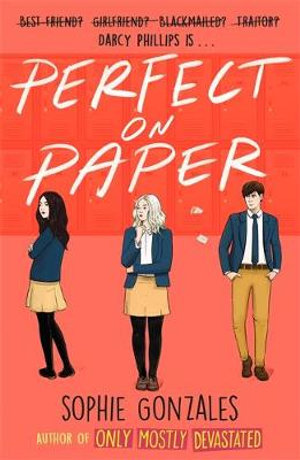Perfect on paper by Sophie Gonzales

Darcy Phillips has a complex life and family. Her parents are separated, her older sister is a creative transgender and Darcy is actively involved in the Queer and Questioning Club at her USA school, identifying as queer. Darcy has had a long-term crush on her best friend Brooke, but it has never been realised as a romance, but the friendship is warm and close. Because her mother is a teacher at her school Darcy has regularly waited on campus after school and this provided the opportunity to take 'ownership' of a locker which has become her mailbox for her 'Relationship advice service'. Despite her youth, she has become remarkably knowledgeable and wise with her advice which is well-researched and psychologically balanced, as well as being quite lucrative and she has managed to keep her identity very secret. When Alexander Brougham, a wealthy and good-looking former South Aussie, who has his own relationship and family predicaments, discovers her identity as the 'Agony Aunt' he pays well for good advice. The secrecy her service demands and the lies she once told to keep Brooke unattached will one day come back to haunt her, but along the way she also swings in her affections and discovers that Alexander Brougham is more than just a client to her. The complexities of life and romance for the coterie of teens is quite charming.
Because this book is openly written as a Queer Rom-Com, it could have been quite opinionated, but the author (who has a psychology role as well as being an author) has just created a well-written romance story with a plethora of LGBTIQ teens populating the very normal dramas of teenage life and romance. The advice to problems of the mostly heterosexual clientele is given as email responses scattered amongst the narrative and is extraordinarily rich in its wisdom. There is a light touch in the way relationships are discussed, balanced insights into relationship complexities and an almost comedic deftness in dealing with Darcy's own ironies as she struggles to work out her own relationship dramas while successfully solving the problems of others with ease. Maturity will be needed for readers, but LGBTIQ young people will appreciate seeing themselves in YA literature.
Themes: LGBTIQ, Romance, Relationships, Lies and secrets, USA schools.
Carolyn Hull